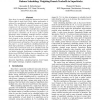Free Online Productivity Tools
i2Speak
i2Symbol
i2OCR
iTex2Img
iWeb2Print
iWeb2Shot
i2Type
iPdf2Split
iPdf2Merge
i2Bopomofo
i2Arabic
i2Style
i2Image
i2PDF
iLatex2Rtf
Sci2ools
MICRO
1999
IEEE
1999
IEEE
Balance Scheduling: Weighting Branch Tradeoffs in Superblocks
Since there is generally insufficient instruction level parallelism within a single basic block, higher performance is achieved by speculatively scheduling operations in superblocks. This is difficult in general because each branch competes for the processor's limited resources. Previous work manages the performance tradeoffs that exist between branches only indirectly. We show here that dependence and resource constraints can be used to gather explicit knowledge about scheduling tradeoffs between branches. The first contribution of this paper is a set of new, tighter lower bounds on the execution times of superblocks that specifically accounts for the dependence and resource conflicts between pairs of branches. The second contribution of this paper is a novel superblock scheduling heuristic that finds high performance schedules by determining the operations that each branch needs to be scheduled early and selecting branches with compatible needs that favor beneficial branch trad...
Hardware | Lower Bound | MICRO 1999 | Scheduling Heuristic Outperforms | Superblock Scheduling Algorithms |
| Added | 04 Aug 2010 |
| Updated | 04 Aug 2010 |
| Type | Conference |
| Year | 1999 |
| Where | MICRO |
| Authors | Alexandre E. Eichenberger, Waleed Meleis |
Comments (0)

